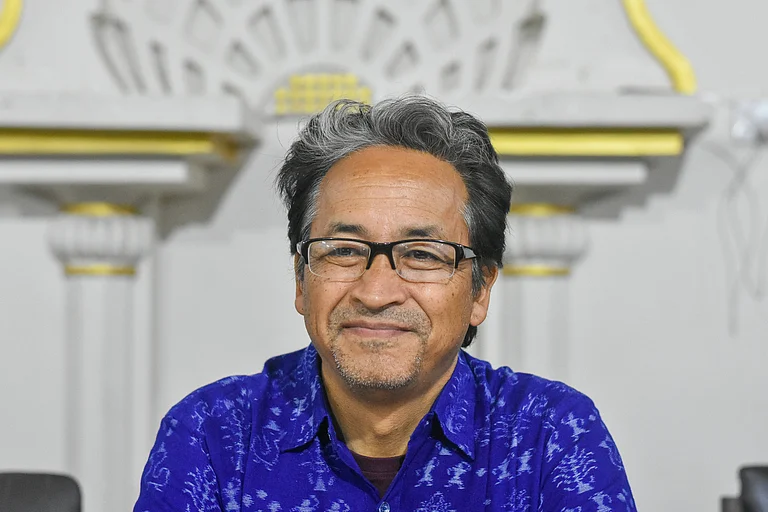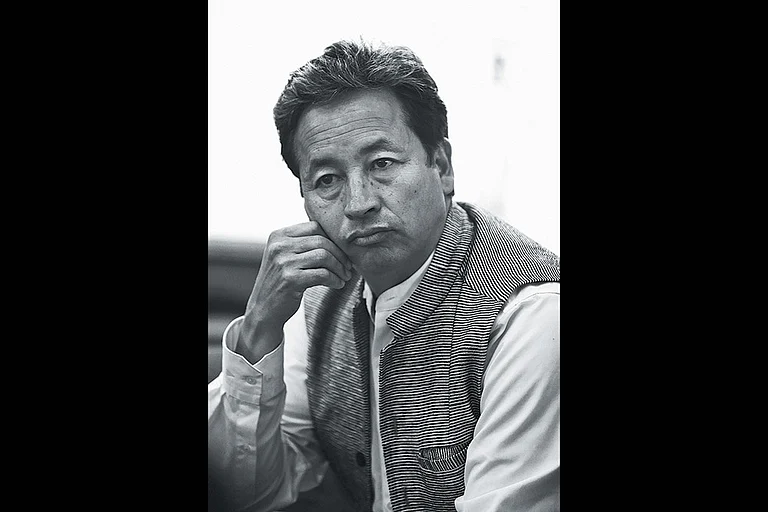In the cold climate of Ladakh, where water freezes at a bone-chilling minus 17 degrees, Ladakhi innovator Sonam Wangchuk, at present is undertaking a fast unto death. As he enters his fifth day of this protest, Wangchuk says he draws inspiration from the Gandhian legacy to endure this fast for 21 days, initially.
Wangchuk asks for the Sixth Schedule for the region and has termed his fast as the climate fast. In his videos posted on social media platforms, Wangchuk says in the lead-up to the 2019 parliamentary elections, the BJP, in its manifesto, pledged to include Ladakh under the Sixth Schedule. However, Wangchuk then laments that by 2020, the BJP had forgotten its promise, despite the unequivocal support it received from Ladakhi voters during the elections.
The disillusionment, he says, deepened during the Ladakh Autonomous Hill Development Council (LAHDC) elections in 2020, where the people of the region, feeling betrayed, chose to boycott the polls. Wangchuk recounts how the Union government, in response to the poll boycott call of the Ladakhi leaders, assured them of inclusion of the Sixth Schedule post the LAHDC elections, motivating them into believing in their promises once more. He says innocent leaders of Ladakh believed the Union Government and voted the BJP to power in the Hill Council polls.
However, Wangchuk says these assurances were merely empty gestures. For the past four years, he says, the Union government has resorted to delaying tactics. Now, on March 4 this year, the Union government, he says, has declared its stance, going back on its earlier “commitment” by stating that Ladakh will not be granted the Sixth Schedule. When on March 6 Wangchuk begun his fast, he said, “I've chosen 21 days because this was the longest fast that Mahatma Gandhi observed during the Indian independence movement, and I want to follow the same peaceful path that Mahatma Gandhi followed where we inflict pain on ourselves, where we don’t inflict pain on anyone else, we don’t take hostage anybody else, we take ourselves hostage, inflict pain on ourselves so that our government and policy makers notice our pain and act on time.”
“So, I'm Sonam Wangchuk, reaching out to people of the world from the Indian Himalayas, a place called Leh in Ladakh, at 3,500 meters (11,500 feet). Why am I reaching out to you today? Today our planet is going through huge challenges, environmental challenges such as global warming and climate change. Nowhere are these challenges more evident than in the Himalayas, especially on the Tibetan Plateau where we are right now,” he said.
“You might have heard about the challenges faced by our Tibetan brothers and sisters, where dams are being built indiscriminately and the environment is exploited blindly. Similarly, on the Indian side of the Himalayas in Ladakh, we're beginning to face similar challenges. Our glaciers are melting rapidly, leading to droughts and flash floods, and soon many of us may become climate refugees,” he added.
“To protect this part of the Himalayas, often referred to as the 'third pole' is not just the responsibility of Ladakhis but of the entire global planet earth,” he adding the area hosts the largest reservoir of freshwater after the North and South Poles and directly or indirectly supports around 2 billion people, a quarter of the planet's population. He said people living in big cities around the world, can contribute significantly to preserving these Himalayas.
“Firstly, by living simpler lives and reducing your carbon footprint, you can help mitigate climate change and the melting of our glaciers. If you simply, we in the mountains can simply live,” he added. Secondly, he said, people of Ladakh have gathered to demand safeguards for these mountains and their fragile ecosystems from governments elected by the people.” He said few governments prioritize protecting nature and the indigenous people who inhabit these mountains. India, however, he said, is one such country that has constitutional provisions, such as Article 244 of the Sixth Schedule, aimed at safeguarding these regions and the cultures of their indigenous inhabitants. He said Ladakh, with its indigenous tribal population of 97%, qualifies for such protection. He said the people of Ladakh, are gathering in Leh to remind the government of its promises and to urge them to fulfil their obligations to protect the region.
He repeated that the BJP has promised them a sixth schedule and that Ladakh not only qualifies but over-qualifies with its huge percentage of tribal population. While he asks people of the world to write to the Union Government from Delhi to Paris, London to New York to support the nature and indigenous people of Ladakh and is hopeful of his struggle to make the Union government fulfil its promises, analysts are not hopeful.
However, analysts like Praveen Dhonti, Senior Analyst India, Crises Group told Outlook last week that after reorganizing the erstwhile state of Jammu and Kashmir into two union territories in 2019, the Central Government never promised statehood to Ladakh, unlike Jammu and Kashmir. “Prime Minister Narendra Modi himself assured the people of Kashmir that the statehood will be restored, and elections will be held but there is no progress on that front yet. So, it is unlikely that New Delhi will grant statehood for Ladakh, as it is tied up with the border crisis with China and also the government’s plans in Kashmir,” Dhonti said.
“Granting the Sixth schedule will set a precedent that will be difficult for the central government to deal with. For instance, the Kuki-Zo community is also demanding a separate administration and sixth schedule in Manipur at the moment. It might, however, grant some concessions beyond the framework of statehood and sixth schedule, eventually, regarding safeguards to protect culture, language, land, ecology, and employment,” Dhonti added.






















